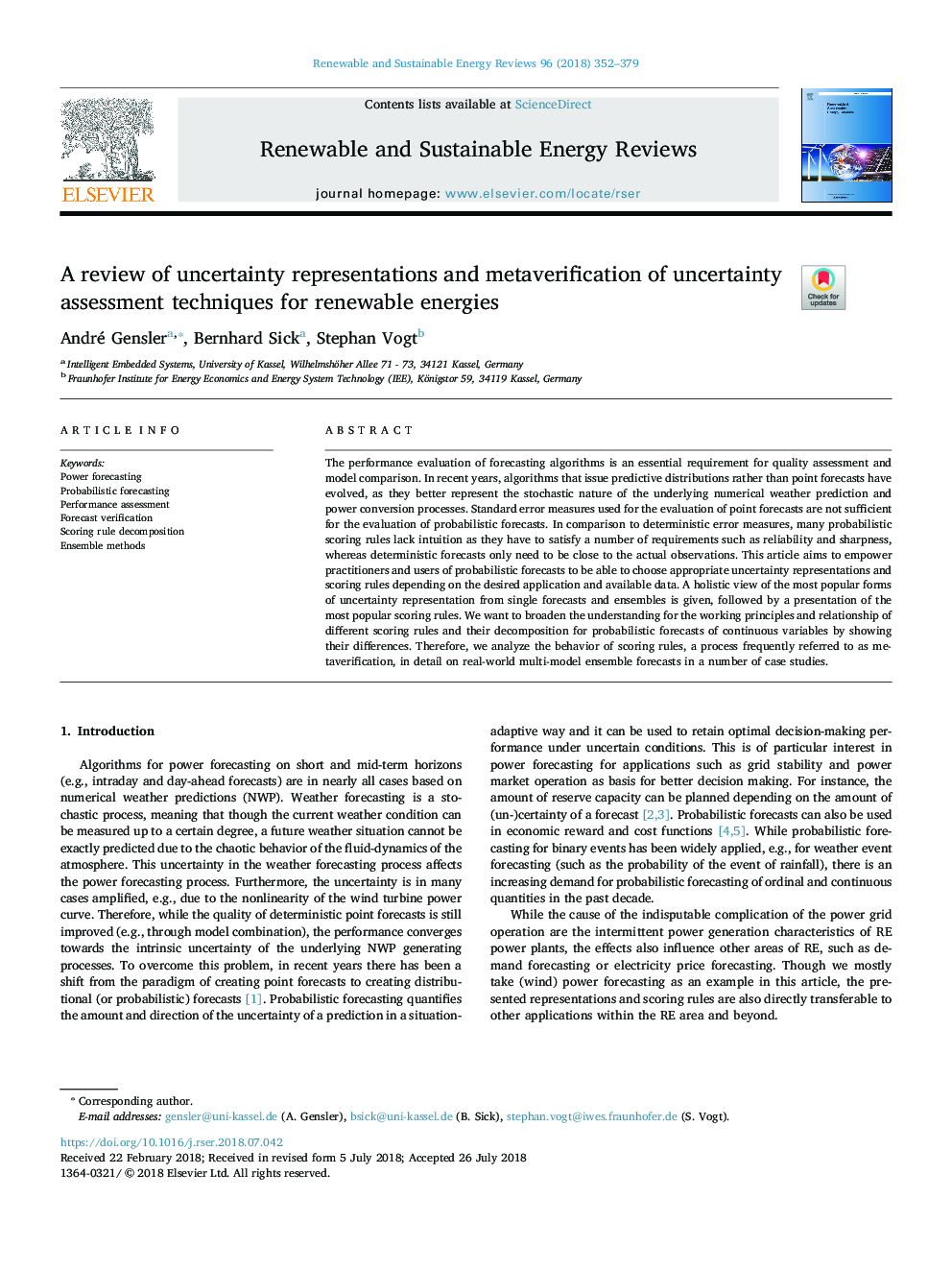| کد مقاله | کد نشریه | سال انتشار | مقاله انگلیسی | نسخه تمام متن |
|---|---|---|---|---|
| 8110231 | 1522288 | 2018 | 28 صفحه PDF | دانلود رایگان |
عنوان انگلیسی مقاله ISI
A review of uncertainty representations and metaverification of uncertainty assessment techniques for renewable energies
ترجمه فارسی عنوان
بازبینی بازنمودهای عدم اطمینان و متاثرکردن روشهای ارزیابی عدم قطعیت برای انرژیهای تجدیدپذیر
دانلود مقاله + سفارش ترجمه
دانلود مقاله ISI انگلیسی
رایگان برای ایرانیان
کلمات کلیدی
پیش بینی قدرت، پیش بینی احتمالی، ارزیابی عملکرد، تأیید پیش بینی، تجزیه قوانین امتیازدهی، روش های گروهی،
ترجمه چکیده
ارزیابی عملکرد الگوریتم های پیش بینی یک الزام ضروری برای ارزیابی کیفیت و مقایسه مدل است. در سال های اخیر، الگوریتم هایی که توزیع پیش بینی را به جای پیش بینی های نقطه انتشار می دهند، تکامل یافته اند، زیرا آنها بهتر از طبیعت اتفاقی پیش بینی های عددی و فرآیند تبدیل قدرت هستند. معیارهای خطای استاندارد مورد استفاده برای ارزیابی پیش بینی های نقطه برای ارزیابی پیش بینی های احتمالی کافی نیست. در مقایسه با معیارهای خطای قطعی، بسیاری از قوانین به ثمر رساند احتمالاتی به دلیل عدم رعایت چندین الزامات از قبیل قابلیت اطمینان و تیزهدشی، فاقد شهود هستند، در حالی که پیش بینی های قطعی فقط باید نزدیک به مشاهدات واقعی باشد. این مقاله به منظور تقویت تمرینکنندگان و کاربران پیش بینی احتمالاتی، قادر است تا نمایه های نامطمئن مناسب و قوانین به ثمر برساند بسته به برنامه کاربردی مورد نظر و داده های موجود. دیدگاه جامع از محبوب ترین فرم های نمایندگی عدم قطعیت از پیش بینی ها و گروه های تک، داده می شود، و پس از آن ارائه محبوب ترین قوانین به ثمر رساند. ما می خواهیم درک برای اصول کار و ارتباط قوانین مختلف به ثمر رساند و تجزیه و تحلیل آنها برای پیش بینی احتمالات متغیرهای پیوسته با نشان دادن تفاوت های آنها گسترش دهیم. بنابراین، در تعدادی از مطالعات موردی، ما را به تجزیه و تحلیل رفتار قوانین به ثمر رساند، یک فرایند که اغلب به عنوان معیار اندازه گیری، به طور دقیق در پیش بینی گروه های چند مدل در دنیای واقعی واقع شده است.
موضوعات مرتبط
مهندسی و علوم پایه
مهندسی انرژی
انرژی های تجدید پذیر، توسعه پایدار و محیط زیست
چکیده انگلیسی
The performance evaluation of forecasting algorithms is an essential requirement for quality assessment and model comparison. In recent years, algorithms that issue predictive distributions rather than point forecasts have evolved, as they better represent the stochastic nature of the underlying numerical weather prediction and power conversion processes. Standard error measures used for the evaluation of point forecasts are not sufficient for the evaluation of probabilistic forecasts. In comparison to deterministic error measures, many probabilistic scoring rules lack intuition as they have to satisfy a number of requirements such as reliability and sharpness, whereas deterministic forecasts only need to be close to the actual observations. This article aims to empower practitioners and users of probabilistic forecasts to be able to choose appropriate uncertainty representations and scoring rules depending on the desired application and available data. A holistic view of the most popular forms of uncertainty representation from single forecasts and ensembles is given, followed by a presentation of the most popular scoring rules. We want to broaden the understanding for the working principles and relationship of different scoring rules and their decomposition for probabilistic forecasts of continuous variables by showing their differences. Therefore, we analyze the behavior of scoring rules, a process frequently referred to as metaverification, in detail on real-world multi-model ensemble forecasts in a number of case studies.
ناشر
Database: Elsevier - ScienceDirect (ساینس دایرکت)
Journal: Renewable and Sustainable Energy Reviews - Volume 96, November 2018, Pages 352-379
Journal: Renewable and Sustainable Energy Reviews - Volume 96, November 2018, Pages 352-379
نویسندگان
André Gensler, Bernhard Sick, Stephan Vogt,
